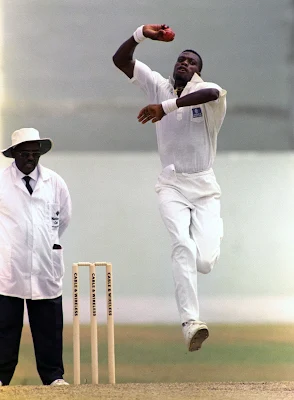Standing tall at 6 feet 7 inches, Curtly Ambrose was a fearsome sight on the cricket field, reminiscent of a tsunami in full force. While there have been faster and more versatile pace bowlers throughout history, few matched Ambrose's combination of aggression and accuracy.
Amidst the 25th anniversary of his retirement in 2000, which followed the celebration of his 60th birthday last September, we reflect on his extraordinary impact on the game.
Ambrose's bowling arsenal included a menacing bouncer and an almost unplayable yorker that would threaten batsmen directly at their feet, often penetrating their defenses.
His ability to generate steep, vertical bounce in all conditions was unmatched. He combined the pace of Michael Holding, the accuracy of Joel Garner, and the skill of Andy Roberts to create an uneasy experience for batsmen, often forcing them to face balls that moved away sharply from the off stump.
The dramatic snap of Ambrose's wrist during delivery gave his balls added speed and lethality, and his celebratory fist pumps upon taking a wicket were iconic.
Off the field, however, Ambrose reveals a different side—a musician at heart, playing the guitar with a gentle grace, characterized by a warm smile reminiscent of a sliced watermelon.
Interestingly, cricket was not a passion of his childhood. Born in Swetes village, Antigua, he initially pursued basketball before a push from his cricket-enthusiastic mother ignited his interest in the sport. He entered the cricket scene later than most, making his league cricket debut in Lancashire at the age of 25, and quickly showing promise in the Red Stripe tournament with 35 wickets at an astonishing average of 15 runs.
Ambrose was known for his ability to swing the momentum of a game, often leading his team from the brink of defeat to victory. In the series of 1988-89, he claimed 26 wickets at an average of just over 21, helping the West Indies retain the Frank Worrall Trophy. His standout performances at Perth included figures of 5 for 72 and 3 for 66, dazzling Australian batsmen with his legendary bouncers.
In a breathtaking display in 1990 against England in Barbados, with victory looking unlikely, Ambrose dismantled the English batting lineup, recording figures of 8 for 45—five of his victims fell to lbw decisions. Another memorable performance came in the 1992 series against South Africa, where he took 6 for 34 and turned the tide when South Africa seemed destined for success. His brilliance extended to 1994 when he decimated the English batting order, taking six wickets for just 24 runs at Trinidad as they attempted to chase a target of 192.
Ambrose's spell was a masterclass in pace bowling, instilling fear in every batsman he faced. In another remarkable performance in 1992-93, he showcased his skill in Perth with 7 for 25, delivering a spell of bowling that sent shockwaves through the Australian lineup. Over the years, he relished the opportunity to shine overseas, boasting an impressive record.
In 1995, he achieved figures of 5 for 45 and 4 for 20 in Trinidad, further solidifying his status as a game-changer. Ambrose concluded his Test career with 405 wickets in 99 matches, maintaining an average of 20.99—an incredible achievement for any bowler.
Ambrose was equally formidable in One Day Internationals, finishing with 225 wickets at an average of 24.13 over 176 matches. His exceptional opening spell during the 1996 World Cup semi-final at Chandigarh remains a highlight in his ODI career.
As we evaluate Ambrose's legacy, it is clear he ranks among the finest fast bowlers in cricket history. Curiously, despite playing during a time of turbulence for West Indies cricket, his bowling remained consistently lethal. Teaming with Courtney Walsh, the duo formed one of the most successful bowling partnerships in cricket, contributing to numerous victories across their lengthy tenure.
Ambrose's records speak for themselves—he holds series records in Australia and proved a dominant force with significant wicket tallies in challenging conditions. While there were aspects of his game, such as performance on flat tracks, that drew criticism, his ability to thrive under pressure remains unparalleled.
In the pantheon of cricket legends, he can be placed in the top tier of fast bowlers, contending that his aggressive style and impactful spells make him a natural inclusion in an all-time Test XI—perhaps just edging out contemporaries like Glenn McGrath for his sheer demolishing ability.
---
*Freelance journalist



Comments